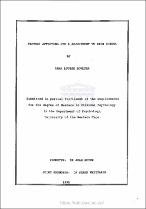| dc.contributor.advisor | Meyer, Joan | |
| dc.contributor.author | Boulter, Sara Louise | |
| dc.date.accessioned | 2023-02-06T09:04:08Z | |
| dc.date.available | 2023-02-06T09:04:08Z | |
| dc.date.issued | 1995 | |
| dc.identifier.uri | http://hdl.handle.net/11394/9546 | |
| dc.description | Magister Psychologiae - MPsych | en_US |
| dc.description.abstract | More emphasis has traditionally been placed on school readiness and adjustment at primary school leve1 than at high school leveI. Many adolescents do, however, experience problems adjusting to the new high school environment when they enter Standard six. In the current South African climate these pupils not only have to adjust to a new stage in their life - adolescence - and a new, school, but they also have to adjust to the context of an education system which itself has to adjust to ongoing legislative changes. In accordance with systems theory, it is anticipated that these changes will affect the adolescent's ability to adjust to high school. The purpose of this study was to identify factors which affect the Standard six pupil's adjustment to high school. It was envisaged that this research would inform a psychoeducation programme to facilitate more effective adjustment to high school. Ninety pupils were sampled from Standard six classes in different types of English-medium high schools in the Cape Peninsula. Three psychometric instruments were used to identify factors associated with adjustment to high school. These were the High school personality Questionnaire (HSPQ); the Personal, Home, Social and Formal Relations
Questionnaire (PHSF) and the South African School Adjustment Questionnaire. The latter was a questionnaire designed to collect demographic data and to assess whether factors related to the recent changes in the South African education system affect adjustment. An ex post facto design was used and the data was independently gathered. Two methods of analysis were used. Initia1ly the data was
analysed by means of multiple regression to establish which factors were good predictors of school adjustment. The findings suggested that there are factors which affect an adolescent's adjustment to high school. These factors could be grouped into 3 areas and represented personal, family and social adjustment. Factors measured by the South African School Adjustment Questionnaire did not, appear to
significantly affect adjustment. Poor adjustors appeared to have less self-confidence and a lower self-esteem. They were more distrustful of others and tended to spend more time alone. Subsequently the Hotelling's T2 test was used to establish a profile analysis of both good and weak adjustors. Although it is not possible to generalise the results of this study, the results do suggest that adjustment is difficult for some adolescents entering high school and that, a Psychoeducation Programme which addresses the factors of poor adjustment and fosters the factors associated with better adjustment, would be of value.' | en_US |
| dc.language.iso | en | en_US |
| dc.publisher | University of the Western Cape | en_US |
| dc.subject | Adolescents | en_US |
| dc.subject | South African | en_US |
| dc.subject | Adjustment | en_US |
| dc.subject | Legislative | en_US |
| dc.subject | Personal, Home, Social and Formal Relations Questionnaire (PHSF | en_US |
| dc.subject | South African School Adjustment Questionnaire (SASAQ) | en_US |
| dc.title | Factors affecting STD 6 adjustment to high school | en_US |
| dc.rights.holder | University of the Western Cape | en_US |

